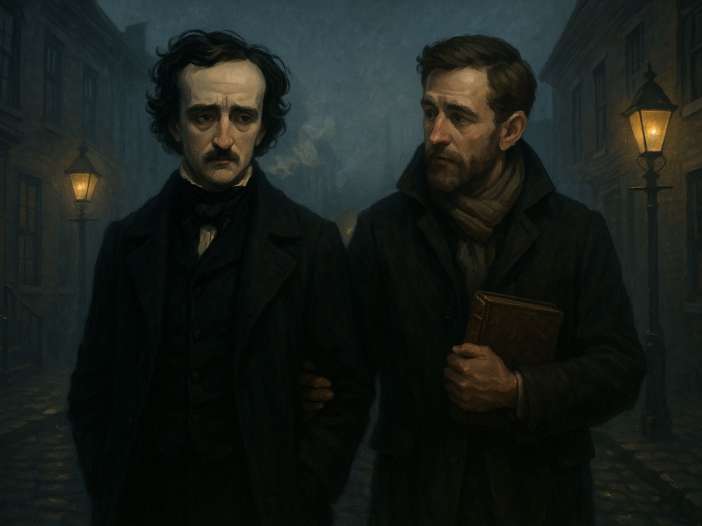
|
Getting your Trinity Audio player ready...
|
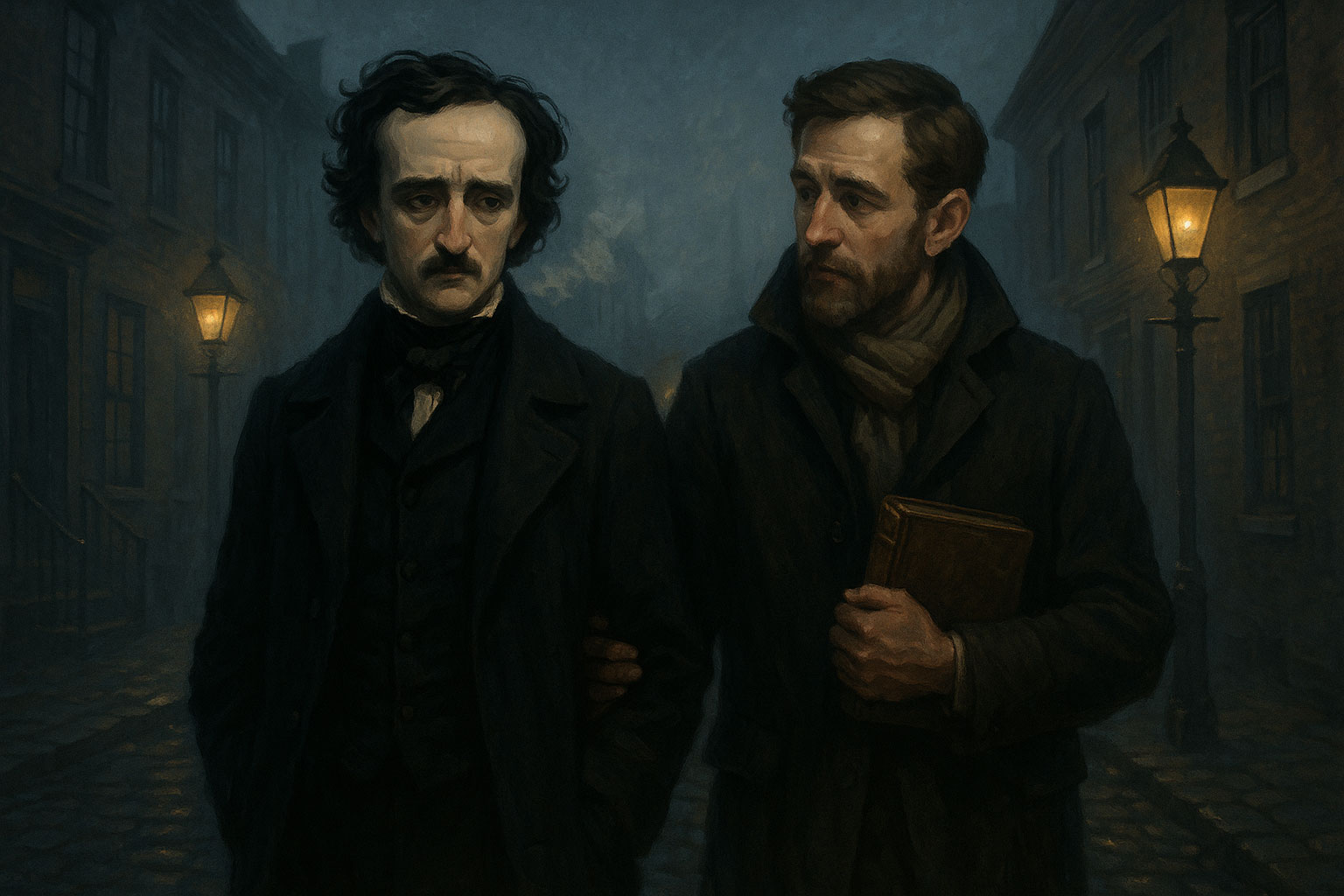
Neil Gaiman:
There are some writers you read, and some writers you enter. Poe was one you entered — and once inside, you were never entirely sure if you’d come out the same. He was an architect of shadows, building mansions of unease where the walls whispered, the floors remembered, and the air itself seemed to carry grief. His prose was a candle burning in a dark room, its flicker both a comfort and a warning.
But for all the strange immortality his words gave him, the man himself walked through life like someone already half-claimed by the other side. Love, for him, was never without loss; success, never without debt; fame, never without suspicion. And in the end, Poe’s own death became the kind of story he might have written — a puzzle box locked from the inside.
On an October day in 1849, he was found delirious on a Baltimore street, dressed in clothes that were not his own. Some whispered of drink, others of illness, still others of darker conspiracies — the ‘cooping’ schemes where men were kidnapped and forced to vote in political fraud. No cause was ever confirmed. The final pages of his life remain smudged, blurred by rumor and rain.
This is not the tale of a man marching toward a clear and certain ending. It is the tale of someone forever walking a narrow bridge between the real and the unreal — and perhaps, in the final crossing, finding himself exactly where he had always belonged.
(Note: This is an imaginary conversation, a creative exploration of an idea, and not a real speech or event.)
Chapter 1: The Boy Who Read in Shadows
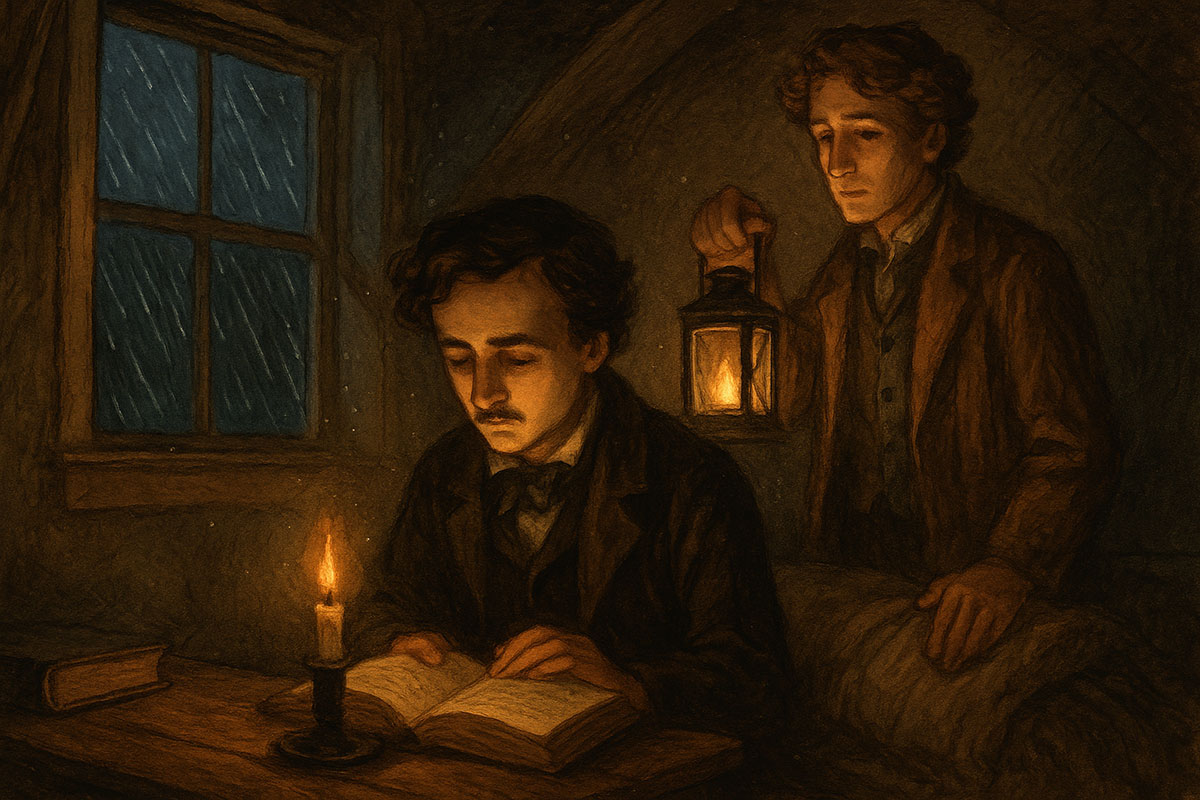
The attic was our kingdom. It was not much to look at — slanted beams, a cracked window that let in the smell of rain and the distant clang of church bells — but it was ours. Dust lay thick on the rafters, and when the afternoon sun angled just right, it lit the motes in slow, golden swirls, as if the air itself were dreaming.
Edgar sat in the far corner, his knees drawn up, a book resting on them like a secret treasure. The candle between us sputtered, its flame fighting the draft that slipped through the windowpane. I held a small lantern to help, cupping it against the breeze.
“Read it again,” I urged, though he had read the same passage twice already. His voice, soft yet deliberate, filled the room, carrying the strange, dark rhythm of the tale. He didn’t merely read — he inhabited the words.
Outside, the rain began to streak the glass, turning the world beyond into a blur. We could have been anywhere, anyone. But in that attic, the world felt smaller, contained between the covers of whatever story Edgar chose to open.
He stopped suddenly, closing the book with a finger marking the page. “Do you know what makes a story immortal?” he asked, looking at me through the wavering light.
I shook my head.
“It isn’t the ink,” he said, tapping the book’s spine. “It’s the shadows between the words — the things you feel but can’t quite name.”
It was a thought beyond my years then, but I remember nodding as if I understood. He had that effect on people — drawing you into a truth you didn’t yet have the tools to hold.
The candle guttered again, and I shifted the lantern closer. Our faces were caught in its glow: his pale, intent; mine wide-eyed, trying to keep up with the currents of his mind. Outside, the rain deepened, tapping the roof in a steady, hypnotic beat.
We read until our eyes blurred. Eventually, the candle burned low, casting long, strange shadows up the attic walls. The stories lingered in the air, thick as the dust, until even the silence seemed part of their telling.
That night, as we parted at the top of the stairs, Edgar paused. “One day,” he said, “we’ll write something so alive that even death won’t have the heart to take it.”
I laughed then, not knowing how much of his life — and mine — would be spent trying to prove it true.
Chapter 2: The Letter from the Unknown
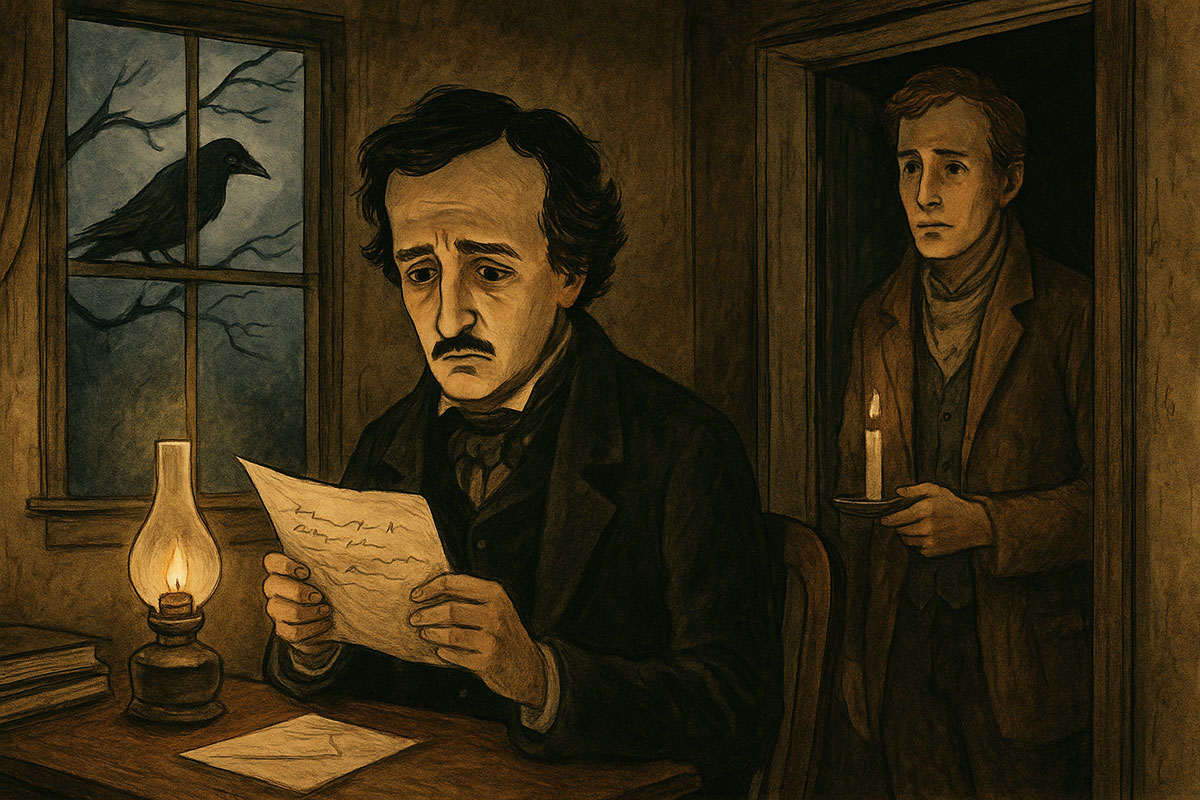
It was a late winter evening in the boarding house, the kind of night when the cold crept into your bones no matter how tightly you wrapped your coat. The lamplight in Edgar’s small room was the only warm thing about it — a fragile glow fighting back the shadows. Outside, a bare-limbed tree tapped its bony fingers against the glass as if asking to be let in.
I had stopped by with a tin of coffee grounds, a rare luxury in those days, but found him hunched over his desk, a folded sheet of paper trembling slightly in his hand. The expression on his face made me pause in the doorway.
“Who’s it from?” I asked.
He didn’t answer immediately. Instead, he kept staring at the letter as though the ink might rearrange itself if he looked long enough. Finally, he murmured, “I don’t know. There’s no signature. No return address. Just… words.”
I stepped closer, the floorboards groaning under my weight. The lamplight caught the edge of the page, revealing lines written in an elegant but hurried script. I recognized none of it — not the hand, not the voice in the words.
“What does it say?”
He read aloud, his voice low, almost reluctant:
“Your genius is your curse, your shadow is your inheritance. The path ahead will lead you to ruin, yet to turn from it will leave you forgotten.”
A shiver moved through the room.
Outside, a raven landed on the branch just beyond the window, its dark eyes catching the lamplight like bits of flint. Edgar glanced at it briefly, then back at the letter.
“It’s a trick,” I said quickly, though I wasn’t sure if I believed it. “Someone playing games.”
He shook his head. “No… this feels different. As though the words knew me before I ever saw them.”
We sat in silence for a moment, the kind that grows heavy with possibilities you’d rather not name. I reached for the letter, but he pulled it back slightly, his fingers curling around it protectively.
“Some messages,” he said quietly, “aren’t meant to be shared. Not in full.”
The raven outside shifted its weight, tilting its head as if it too were listening. The lamplight flickered then, as though disturbed by a sudden breath of air. I found myself glancing toward the shadows in the corner, half expecting to see them moving.
At last, Edgar folded the letter and tucked it inside a drawer. “If it’s a warning,” he said, “then the only thing to do is follow it and see if it’s true.”
I wanted to argue, to tell him to throw it into the fire, but the look on his face stopped me. He had already decided.
When I left that night, the raven was still on the branch, watching me go.
Chapter 3: The Night of the Reading

The evening was wrapped in a kind of stillness that made every sound seem sharper — the rattle of carriage wheels outside, the muffled clink of glasses in the tavern below, the low murmur of voices gathering in the back parlor. Inside, candles stood in tall iron holders, their flames leaning in the faint draft that slipped under the door. The shadows they cast danced along the walls like restless spectators.
Edgar stood near the small lectern, his hands resting lightly on a worn copy of his poem. He had been invited to read The Raven for a small literary circle, the kind of gathering where curiosity and judgment sit side by side.
I had taken my place in the front row, close enough to catch the faint scent of his tobacco, close enough to see the way his eyes moved across the audience, weighing them. He met my gaze for a fraction of a second — not in search of comfort, but as if to remind me that he was about to step onto a thin and perilous ledge.
The room quieted when he began.
“Once upon a midnight dreary, while I pondered, weak and weary…”
The words poured from him in a slow, deliberate cadence, each syllable placed like a step in an old and dangerous dance. He didn’t simply read — he inhabited the poem, letting it coil around his voice until it seemed the air itself had grown heavier.
I watched the faces in the crowd — a woman in a pale shawl leaning forward, a man with spectacles clutching his knees as though bracing for something unseen. Even the candles seemed to still, their flames holding steady in the charged silence.
When he reached the first utterance of “Nevermore,” it was as though a shadow had crossed the room. His voice deepened, and the sound lingered, curling into the corners like smoke. Somewhere in the back, a chair creaked. I thought of the raven outside his window days before, its black eyes fixed on him as he read the strange letter.
The poem carried on, the rhythm quickening, his voice gaining an almost fevered urgency. By the time he reached the final lines, the air felt taut, as if we were all holding the same breath.
“And my soul from out that shadow that lies floating on the floor
Shall be lifted—nevermore!”
The silence afterward was not immediate applause but something more intimate — a stillness that felt like reverence, or perhaps unease. Then the clapping began, hesitant at first, then swelling into a genuine, if somewhat unsettled, ovation.
He stepped back from the lectern, nodding slightly, his eyes unfocused, as though still listening to an echo only he could hear. I wanted to speak to him, to say something about the way the poem seemed to draw the room into another world entirely. But before I could, he slipped through the narrow doorway to the side, disappearing into the shadowed hall.
I stayed seated for a moment, the echo of “Nevermore” still in my ears, wondering if he had left the room — or if, in some way, we all had.
Chapter 4: The Raven’s Shadow

The rain had been falling for hours, turning Baltimore’s narrow streets into ribbons of black glass. Gas lamps burned in trembling halos, their light struggling against the wind. I was on my way to the tavern, drawn by the faint hope that Edgar might be there, though he had been unaccounted for two days.
When I found him, it was as if the city itself had exhaled him into the street — crumpled against a brick wall, his hat lost, his clothes clinging to him in the cold. His eyes fluttered open as I knelt beside him, my hands already under his shoulders.
“Edgar,” I said, shaking him gently. “It’s me. You’re safe now.”
His lips moved, forming words I couldn’t catch over the rain. I leaned closer, the scent of damp wool and something acrid — spirits, perhaps — rising between us. But his breath was shallow, his voice no more than a thread.
“Not… safe,” he whispered, his gaze unfocused. “They… watch.”
I glanced around. The street was empty, save for the warm spill of light from the tavern doorway. A raven — or what I thought to be one — perched on the bare branch of a tree just beyond. Its black eyes fixed on us, unblinking.
“You’re coming with me,” I said firmly. I tried to lift him, but his legs buckled. His weight was startling — not heavy, but hollow, as if life itself were slipping from his bones.
We staggered toward the tavern. The barkeep looked up in surprise as we entered, dripping onto the floorboards. “Get a blanket,” I barked. “And whiskey. Now.”
They brought both, and I wrapped the blanket tight around Edgar’s shoulders. He shivered violently, though the room was warm. His hand gripped my sleeve with desperate strength.
“Promise me,” he said, his voice breaking. “If… I’m not myself… you’ll remember me as I was.”
I stared at him, my throat tightening. “You’ll be yourself again. Just hold on.”
But his eyes closed, and his head sagged forward. I called for help, for a doctor, for anything that could keep the darkness from swallowing him. The night outside deepened, the rain beating harder against the windows.
And somewhere, in the shadows beyond the lamplight, I swore I saw the raven take flight.
Chapter 5: The Final Crossing
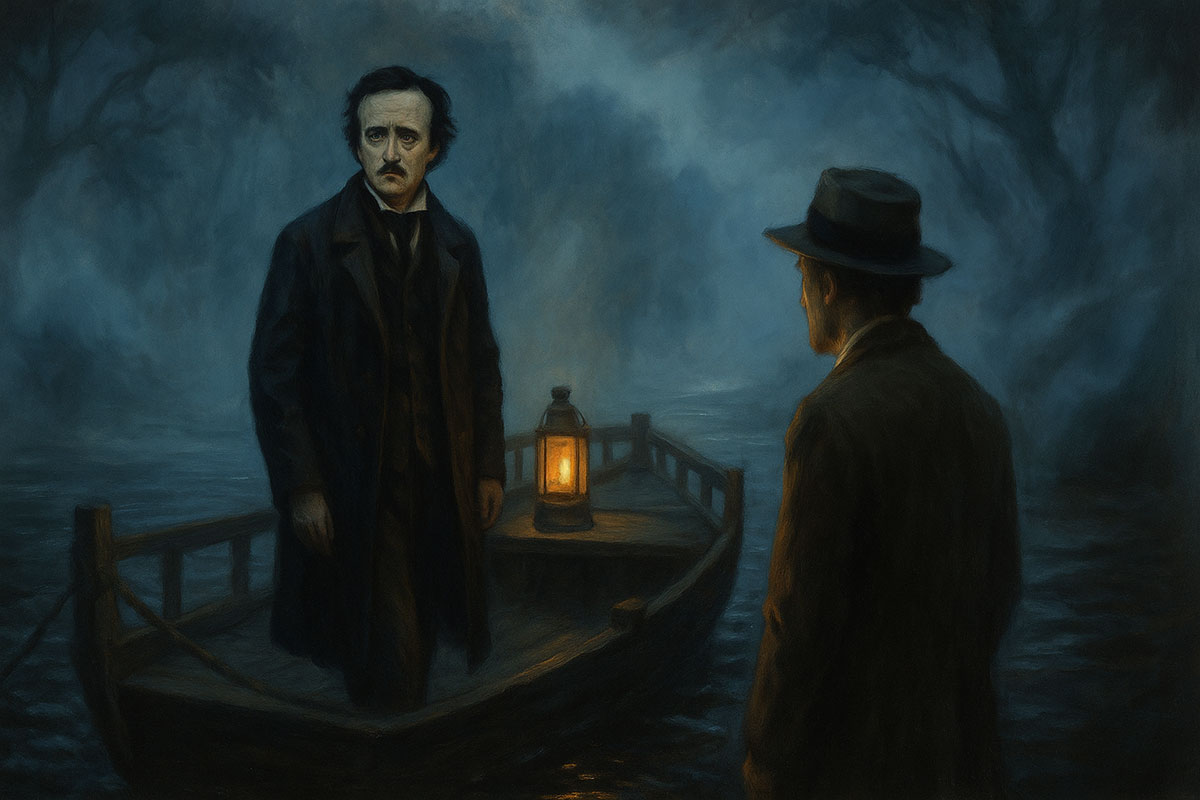
The river was wrapped in mist that night, the kind of mist that seems to muffle the very heartbeat of the world. A small ferry waited at the dock, its lantern swaying gently with the tide.
Edgar stood at the edge of the pier, his dark coat pulled tight, his breath rising in pale clouds. I was beside him, though neither of us spoke for a long while. The only sound was the lapping of water against the pilings and the creak of the ferry’s ropes.
“They say the ferry rides smoother on nights like this,” he murmured finally, his voice calm, almost detached.
“Where are you going?” I asked, though I felt the answer before he spoke.
“Where all stories go,” he said, turning toward me with the faintest smile. “To find their ending.”
I tried to laugh, to shake him from this strange mood, but the weight in the air was immovable. His eyes — still sharp, still Poe’s — were lit with something beyond this shore, a horizon I could not see.
The ferryman appeared from the mist, his lantern light spilling over the dock. He said nothing, only nodding at Edgar as though they had met before. Edgar stepped forward, but paused, his boots clicking softly on the wet boards.
“You’ve been the one constant,” he said to me. “The only witness who stayed.”
“And I’d stay still, if I could,” I replied, the words tasting of salt and grief.
He extended his hand, and I took it. It was cold, yet steady. For a moment, we were boys again — the attic, the candlelight, the promise that we’d write until the world had no more pages.
Then he let go.
The ferry rocked slightly as he stepped aboard. The lantern on its bow glowed gold against the silver fog, a lone star in the dark. The ferryman untied the rope, and the current took them.
Edgar stood at the stern, looking back at me. I raised my hand, and he raised his in return. The mist thickened, the outlines blurred, and soon the ferry was only a shadow. Then not even that.
I stood there long after the water had gone still, the lantern’s reflection gone from the river. The night was quiet now, the kind of quiet that listens.
And I wondered if, somewhere beyond the fog, he was telling his stories still.
Final Thoughts By Neil Gaiman
In the world Poe created, death was not an ending but an echo — a voice that lingered in the corridors long after the footsteps had gone. To read him is to understand that the veil between the living and the dead is made not of iron, but of breath.
Standing there at the misted river in our last chapter, watching him pause before the ferry, I imagined he might turn and give us one of his half-smiles — not to comfort us, but to tell us the story was never meant to be finished. That some doors are best left ajar. That some truths are not truths at all, but mirrors.
We do not know if his death was illness, accident, violence, or fate’s strange joke. But maybe that is how he wanted it. Maybe the author of 'The Raven' and 'The Tell-Tale Heart' knew that the greatest mystery is the one we can never quite solve. And perhaps, somewhere in that fog, he is still writing — not with ink this time, but with the shadows themselves.
Short Bios:
Edgar Allan Poe — (1809–1849) American writer, poet, and literary critic, best known for his macabre tales and poems like The Raven and The Tell-Tale Heart. A master of suspense and psychological depth, Poe is often credited with pioneering the modern detective story.
Neil Gaiman — (1960– ) British author of novels, comics, and short stories, including American Gods and The Sandman. Known for blending myth, fantasy, and the uncanny, Gaiman has often acknowledged Poe as an influence.
Virginia Clemm Poe — (1822–1847) Poe’s cousin and wife, whose early death deeply affected him. Her memory is said to haunt his later works with themes of loss and beauty.
Rufus Wilmot Griswold — (1815–1857) Literary rival and early biographer of Poe, infamous for writing a defamatory obituary and memoir that skewed public perception of Poe for decades.
John Allan — (1779–1834) Poe’s foster father, a wealthy merchant in Richmond. Their strained relationship, marked by conflict over money and career choices, influenced Poe’s lifelong struggles.

Leave a Reply